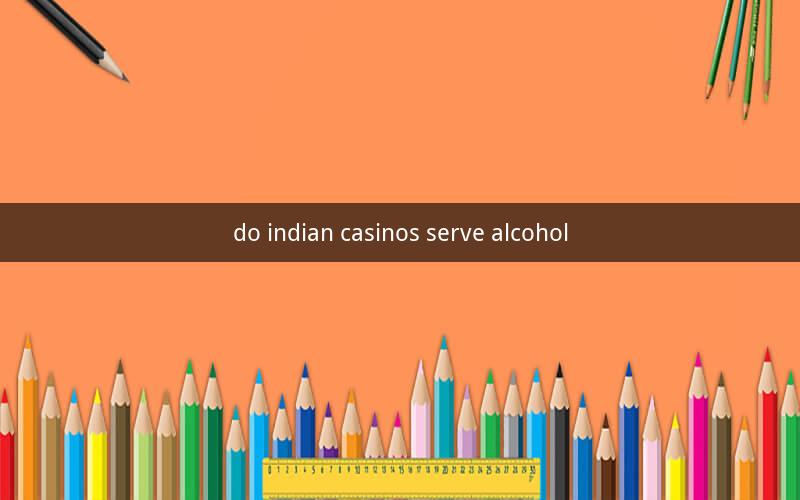
Directory
1. Introduction to Indian Casinos
2. The Legal Landscape of Alcohol in Indian Casinos
3. Types of Indian Casinos and Their Alcohol Policies
4. Cultural Perspectives on Alcohol in Indian Casinos
5. Economic Impact of Alcohol in Indian Casinos
6. Health and Safety Concerns
7. Public Opinion and Controversies
8. Comparing Alcohol Service in Indian Casinos to Other Casinos
9. Future Trends and Challenges
10. Conclusion
1. Introduction to Indian Casinos
Indian casinos, also known as tribal casinos or Native American casinos, are gambling establishments owned and operated by Native American tribes in the United States. These casinos are regulated by the Indian Gaming Regulatory Act (IGRA) of 1988, which allows tribes to offer a variety of games on their sovereign lands. One of the most common questions surrounding Indian casinos is whether they serve alcohol.
2. The Legal Landscape of Alcohol in Indian Casinos
The legality of alcohol service in Indian casinos is a complex issue that varies by tribe and jurisdiction. Generally, tribes have the authority to regulate alcohol on their reservations, which includes the decision to serve alcohol at their casinos. However, this authority is not absolute and is subject to federal, state, and local laws.
3. Types of Indian Casinos and Their Alcohol Policies
Indian casinos can range from small, local establishments to large, resort-style casinos. The policies regarding alcohol service can also vary significantly. Some casinos may offer a full bar, while others may limit alcohol to certain areas or events. Additionally, some tribes may choose to ban alcohol altogether on their premises.
4. Cultural Perspectives on Alcohol in Indian Casinos
The presence of alcohol in Indian casinos is often viewed through the lens of cultural heritage and history. Many tribes have a long-standing relationship with alcohol, and some may use casino revenue to support alcohol and substance abuse prevention programs. However, there are also concerns about the potential negative impacts of alcohol on tribal communities.
5. Economic Impact of Alcohol in Indian Casinos
Alcohol service can significantly impact the economic viability of Indian casinos. It can attract a broader customer base, increase revenue, and create jobs. However, it can also lead to increased costs for security, law enforcement, and healthcare.
6. Health and Safety Concerns
The presence of alcohol in Indian casinos raises concerns about public health and safety. Issues such as drunk driving, violence, and substance abuse can become more prevalent when alcohol is served. Tribes must balance the potential economic benefits with the potential risks.
7. Public Opinion and Controversies
Public opinion on alcohol service in Indian casinos is mixed. Some individuals support the economic benefits and cultural significance, while others are concerned about the potential negative impacts. Controversies often arise when tribes decide to serve alcohol or change their policies.
8. Comparing Alcohol Service in Indian Casinos to Other Casinos
When compared to other types of casinos, such as commercial or state-run casinos, Indian casinos may have more lenient alcohol policies due to their unique legal status. However, the level of alcohol service can still vary significantly among different Indian casinos.
9. Future Trends and Challenges
The future of alcohol service in Indian casinos may be influenced by a variety of factors, including changes in federal and state laws, public opinion, and the evolving needs of tribal communities. Tribes must navigate these challenges while also considering the economic and cultural implications of their decisions.
10. Conclusion
The question of whether Indian casinos serve alcohol is a multifaceted issue that touches on legal, cultural, economic, and public health considerations. Tribes must carefully balance these factors when making decisions about alcohol service at their casinos.
---
Questions and Answers
1. Question: How does the IGRA of 1988 affect the alcohol policies of Indian casinos?
Answer: The IGRA grants tribes the authority to regulate gambling and alcohol on their sovereign lands, but this authority is subject to federal, state, and local laws.
2. Question: Can Indian casinos ban alcohol altogether?
Answer: Yes, tribes have the legal right to ban alcohol on their reservations, including at their casinos.
3. Question: What is the economic impact of alcohol service in Indian casinos?
Answer: Alcohol service can attract a broader customer base, increase revenue, and create jobs, but it can also lead to increased costs for security and healthcare.
4. Question: How do tribes decide whether to serve alcohol at their casinos?
Answer: Decisions regarding alcohol service are often based on a variety of factors, including cultural heritage, economic considerations, and public opinion.
5. Question: Are there any health and safety concerns associated with alcohol service in Indian casinos?
Answer: Yes, issues such as drunk driving, violence, and substance abuse can become more prevalent when alcohol is served.
6. Question: How does the presence of alcohol in Indian casinos impact tribal communities?
Answer: The impact can vary, but some tribes use casino revenue to support alcohol and substance abuse prevention programs.
7. Question: Are there any legal challenges to alcohol service in Indian casinos?
Answer: Legal challenges can arise when tribes decide to serve alcohol or change their policies, particularly if they are in conflict with local or state laws.
8. Question: How do public opinion and controversies affect alcohol policies in Indian casinos?
Answer: Public opinion and controversies can influence tribal decisions regarding alcohol service, as well as the broader discussion about the role of alcohol in Indian casinos.
9. Question: How do Indian casinos compare to other types of casinos in terms of alcohol service?
Answer: Indian casinos may have more lenient alcohol policies due to their unique legal status, but the level of alcohol service can still vary significantly among different casinos.
10. Question: What are the future trends and challenges for alcohol service in Indian casinos?
Answer: Future trends may include changes in federal and state laws, public opinion, and the evolving needs of tribal communities. Tribes must navigate these challenges while considering economic and cultural implications.